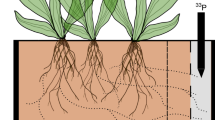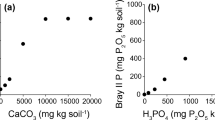Abstract
Direct demonstrations of competition between higher plants for specific soil resources are seldom possible1–3. Previous neighbour plant removal experiments in desert environments have shown increased growth and improved water status of the remaining plants4–6. However, these responses were only measured several months after the removal of neighbours, after which period there would have been ample time for major adjustments in the root distribution of surviving plants. We report here field experiments using dual-isotope labelling to measure opportunistic phosphate acquisition by shrubs within 2 weeks of partial defoliation of neighbouring grass plants. Phosphate isotope uptake from interspaces shared with defoliated grasses increased to as much as six times that of uptake from interspaces shared with unperturbed neighbours. The experiments indicate immediate competition for phosphate and the influence of root physiological activity on this competition.
This is a preview of subscription content, access via your institution
Access options
Subscribe to this journal
Receive 51 print issues and online access
$199.00 per year
only $3.90 per issue
Buy this article
- Purchase on Springer Link
- Instant access to full article PDF
Prices may be subject to local taxes which are calculated during checkout
Similar content being viewed by others
References
1. Harper, J. L. Population Biology of Plants (Academic, New York, 1977). 2. Strong, D. R. Am. Nat. 122, 636–660 (1983). 3. Caldwell, M. M., Eissenstat, D. M., Richards, J. H. & Alien, M. F. Science 229, 384–386 (1985). 4. Fonteyn, P. J. & Mahall, B. E. Nature 275, 544–545 (1978). 5. Robberecht, R., Mahall, B. E. & Nobel, P. S. Oecologia 60, 21–24 (1983). 6. Ehleringer, J. R. Oecologia 63, 153–158 (1984). 7. Caldwell, M. M., Richards, J. H., Johnson, D. A., Nowak, R. S. & Dzurec, R. S. Oecologia 50, 14–24 (1981). 8.Caldwell, M. M., Dean, T. J., Nowak, R. S., Dzurec, R. S. & Richards, J. H. Oecologia 59, 178–184 (1983). 9. Nowak, R. S. & Caldwell, M. M. Photosynthetica 18, 192–200 (1984). 10. Nowak, R. S. & Caldwell, M. M. Oecologia 61, 311–318 (1984). 11. Nowak, R. S. & Caldwell, M. M. J. Range Mmt 39, 443–450 (1986). 12. Richards, J. H. & Caldwell, M. M. /. appl. Ecol. 22, 907–920 (1985). 13. Caldwell, M. M. & Richards, J. H. in On the Economy of Plant Form and Function (ed. Givnish, T.) 251–273 (Cambridge University Press, 1986). 14. Shierlaw, J. & Alston, A. M. Plant Soil 77, 15 (1984). 15. Caldwell, M. M. & Eissenstat, D. M. in Plant Response to Stress—Functional Analysis in Mediterranean Ecosystems (eds Tenhunen, J. D., Catarino, F., Lange, O. L. & Oechel, W. C.) (Springer, Berlin, 1987). 16. Nye, P. H. & Tinker, P. B. Solute Movement in the Soil–Root System (University of California Press, Berkeley, 1977). 17. Massimino, D. et al. Physiol. Plant. 51, 150–155 (1981). 18. Crider, F. U.S. Dep. Agric. Bull. No. 1102 (1955). 19. Hurlbert, S. H. Ecol. Monogr. 54, 187–211 (1984).
Author information
Authors and Affiliations
Rights and permissions
About this article
Cite this article
Caldwell, M., Richards, J., Manwaring, J. et al. Rapid shifts in phosphate acquisition show direct competition between neighbouring plants. Nature 327, 615–616 (1987). https://doi.org/10.1038/327615a0
Received:
Accepted:
Issue Date:
DOI: https://doi.org/10.1038/327615a0
This article is cited by
-
A new method for modeling dissolved phosphorus transport with the use of WaTEM/SEDEM
Environmental Monitoring and Assessment (2017)
-
Root taxa identification in plant mixtures – current techniques and future challenges
Plant and Soil (2012)
-
Interacting effects of grass height and herbivores on the establishment of an encroaching savanna shrub
Plant Ecology (2009)
-
Effects of two species of macroalgae—Ulva pertusa and Gracilaria lemaneiformis—on growth of Heterosigma akashiwo (Raphidophyceae)
Journal of Applied Phycology (2009)
-
Analysis of interactions between the invasive tree-of-heaven (Ailanthus altissima) and the native black locust (Robinia pseudoacacia)
Plant Ecology (2005)
Comments
By submitting a comment you agree to abide by our Terms and Community Guidelines. If you find something abusive or that does not comply with our terms or guidelines please flag it as inappropriate.



